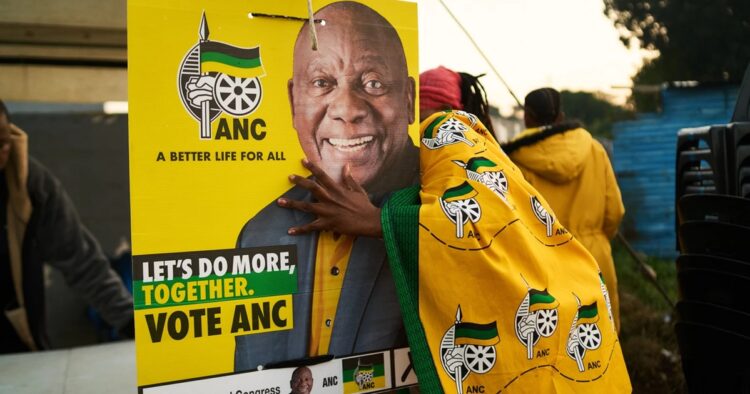In a historic turn of events, South Africa appears to be on the brink of its first national coalition government, as early election results show the ruling African National Congress (ANC) falling well short of a majority.
With over half of the votes counted, the ANC has garnered just under 42% of the national vote, a significant drop from its 2019 performance of 57.5%. While final results are yet to be declared, the prospect of a coalition government is becoming increasingly likely.
The ANC’s decline in support signals a seismic shift in South African politics. The party, which has enjoyed a clear majority since the end of apartheid in 1994, is now facing the possibility of having to form alliances to retain power.
President Cyril Ramaphosa’s bid for a second term hinges on the outcome of coalition negotiations, with the ANC potentially needing a partner to secure governance.
Opposition parties, sensing an opportunity, are open to cooperation. John Steenhuisen, leader of the Democratic Alliance party, expressed readiness to work with the ANC to build a better future for South Africa.
The ANC’s diminishing majority has prompted a reevaluation of political dynamics, paving the way for unprecedented collaborations across party lines.
As coalition talks loom, the composition of the future government remains uncertain. With the ANC still expected to be the largest party, potential partners include the centrist Democratic Alliance and the far-left Economic Freedom Fighters (EFF).
ALSO READ: “South Africa Urges ICJ to Intervene in Israel’s Rafah Assault”
However, ideological disparities among these parties pose challenges, particularly regarding economic policies and governance strategies.
The ANC’s waning popularity reflects deep-rooted socio-economic challenges facing South Africa. Despite significant progress since the end of apartheid, the country grapples with widespread poverty and staggering unemployment rates, particularly among the Black majority.
Years of ANC governance have been marred by corruption scandals, service delivery failures, and infrastructure crises, eroding public trust and support.
The outcome of coalition negotiations will have far-reaching implications for South Africa’s future. Investors closely monitor political developments, with concerns over policy stability and economic direction. While a coalition involving the business-friendly Democratic Alliance could reassure investors, partnerships with ideologically divergent parties like the EFF raise uncertainties, particularly regarding economic policies and market interventions.
Amidst these developments, South Africa stands at a crossroads in its democratic journey. The potential formation of a coalition government marks a significant departure from decades of ANC dominance, signaling a new era of political pluralism and collaboration.
As coalition discussions unfold, the country awaits the outcome that will shape its trajectory in the years to come.

















Comments